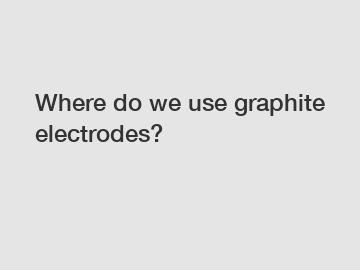Where do we use graphite electrodes?
Where do we use graphite electrodes?
Graphite electrodes play a crucial role in several industries worldwide. From steelmaking to electronics, the applications of graphite electrodes are vast and varied. But where exactly do we use graphite electrodes? Let's explore this intriguing question.
1. Steelmaking Industry:

One of the primary applications of graphite electrodes is in the steelmaking industry. Graphite electrodes are widely used in electric arc furnaces (EAFs) to produce steel. The high melting point and electrical conductivity of graphite make it an ideal material for this purpose. The electrodes carry the electrical current and generate the heat necessary to melt the raw materials (such as scrap metal) and transform them into molten steel. This use of graphite electrodes ensures efficient and cost-effective steel production.
2. Metal Refining:
Apart from steelmaking, graphite electrodes are also utilized in various metal refining processes. They play a significant role in refining metals like copper, nickel, and titanium. During metal refining, impurities need to be removed from the molten metal. Graphite electrodes are used in this process as they can withstand high temperatures and chemically react with the impurities, effectively removing them from the metal. This ensures a higher purity level in the final product.
3. Silicon Industry:
The silicon industry heavily relies on graphite electrodes for the production of silicon and silicon compounds. Graphite electrodes are used in the production of silicon through the carbothermal reduction process. In this process, silica (SiO2) is mixed with carbon and heated in an electric arc furnace, utilizing graphite electrodes. The electrodes supply the required electric current and generate the necessary heat to carry out the reaction, resulting in the production of silicon.
4. Electric Discharge Machining (EDM):
Graphite electrodes find application in the field of manufacturing as well. Electric discharge machining (EDM) is a process used to shape and fabricate hard metals and alloys. It involves the use of graphite electrodes that generate electrical discharges to erode or remove material from the workpiece. Graphite electrodes are chosen for EDM due to their ability to withstand high temperatures and provide superior electrical conductivity, ensuring precision and efficiency in the manufacturing process.
5. Lithium-ion Batteries:
The growing demand for lithium-ion batteries, particularly in portable devices and electric vehicles, also relies on graphite electrodes. Graphite is used as the anode in lithium-ion batteries, as it enables the reversible intercalation of lithium ions during charging and discharging cycles. This ability allows for energy storage and release within the battery. The use of graphite electrodes contributes to the high energy density and long cycle life of lithium-ion batteries.
In conclusion, graphite electrodes find applications in a range of industries, including steelmaking, metal refining, silicon production, manufacturing, and energy storage. These versatile electrodes are essential for several processes, from melting raw materials in the production of steel to removing impurities during metal refining. Their excellent electrical conductivity, high melting point, and ability to withstand extreme temperatures make them invaluable in these applications. As industries continue to evolve, graphite electrodes will undoubtedly remain a critical component in various processes, proving their versatility and indispensability in countless applications.
If you want to learn more, please visit our website 350mm RP Graphite Electrode features, 450mm HP Graphite Electrode Features, 450mm RP Graphite Electrode.


